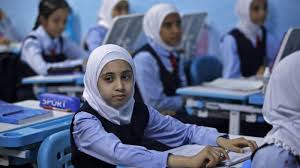UK funding cuts will endanger women and girls, aid organisations warn

London: A UK network representing over a dozen organisations focused on women, peace and security say cutting foreign aid on projects supporting women and girls globally would be an abandonment of the UK’s commitment to human rights and would have “devastating consequences”.
The organisation’s concerns come after comments made last week by Baroness Chapman of Darlington, the newly appointed cabinet member overseeing the UK government’s overseas development assistance, that education and gender programmes were on the chopping block.
The cuts risk “vital funding” being pulled from frontline, women-led organisations worldwide and reversing progress in education, healthcare, protection from violence and women’s participation in political processes, Gender Action for Peace and Security (GAPS) UK has said.
“Successive UK governments have championed gender equality as a cornerstone of the UK’s international work, recognising that the advancement and protection of women’s and girls’ rights is essential to achieving sustainable peace, development and security,” the network said on Monday.
“The decision to remove this as a priority not only undermines this legacy, but has real and devastating consequences for the lives of women and girls around the world.”
Lady Chapman took over the role following Anneliese Dodds’ resignation earlier this year after the government announced that it was reducing international aid from 0.5 percent to 0.3 percent in order to fund an increase in defence spending.
Just months before her resignation, Dodds wrote in Middle East Eye that conflict was catastrophic for development, that its impacts were gendered and that women and girls would “be at the heart of everything” she did.
Last week, Lady Chapman set out how the government plans to “reset” its approach to international development with less money before the international development committee.
“Inevitably, this means that in some areas and countries, there will be less to spend,” she told the committee.
“There is no point being anything other than completely open about this. I think that is likely to be on education and gender.”
Instead, Chapman said the government will focus on humanitarian crises, healthcare and climate change, adding that “the days of viewing the UK government as a global charity” were over and the UK needs to be more of an investor “not just a donor”.
“We cannot just be talking about misery all the time. We need to tell the story of what development can achieve,” she said.
“We have to show the country that we have a strategy that matches their values, supports their interest and that I hope can make the country proud of what we do.”
The committee’s chairwoman and senior Labour MP Sarah Champion pushed back, asking Chapman: “Why on earth are you putting on record that we are no longer supporting education and we are no longer prioritising the rights of women and girls?”
“Why are you not saying that we will be embedding those within everything we are doing, which is where I think they have always been?”
Chapman said that they would, in fact, be mainstreamed and integrated, but also said later, in specific reference to women and girls, that she couldn’t “promise to protect every good programme”.
The UK played a key role in establishing the Women, Peace and Security agenda through a landmark UN Security Council resolution passed in 2000 which recognised the disproportionate impact of armed conflict on women and girls.
The agenda, which evolved from the resolution, is a policy framework that recognises that women must be critical actors in global efforts to achieve sustainable international peace and security.
GAPS UK said the decision to deprioritise gender when it comes to foreign aid is “particularly damning” in this year which marks the 25th anniversary of the agenda’s passage and as violent conflicts have doubled in the past five years.
The rollback, it said, “sends a deeply contradictory and harmful message to international partners and to the grassroots women’s rights organisations and women peacebuilders who continue to deal with the aftermath of conflict and work to prevent its recurrence”.
It called on the government to ensure that gender equality and women and girls remain a standalone priority and ringfence funding for related programmes.
“The UK must not turn away from its responsibilities at a time when global solidarity, principled leadership and meaningful investment in peace and equality are more essential than ever,” it said.





